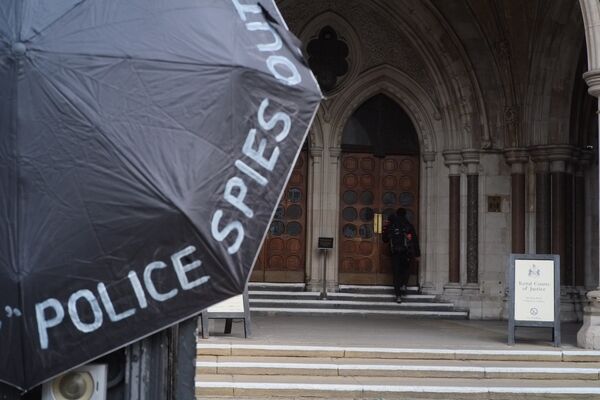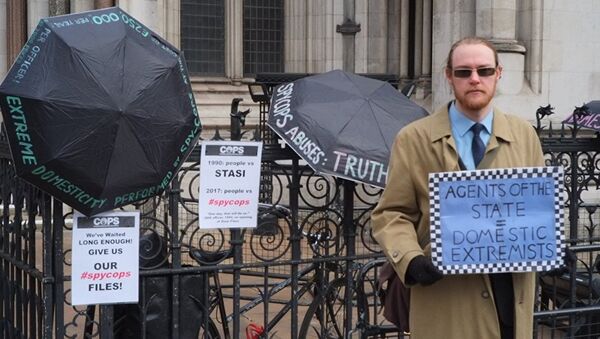In March 2015, following five-years of shocking revelations about police espionage in the UK since 1968, then-Home Secretary Theresa May established the Undercover Policing Inquiry (UCPI). The use of dead children's identities as cover names, deceiving women into long-term relationships, fathering children with activists and committing a wide variety of crimes are just some of the scandalous activities in the Inquiry's investigative crosshairs.
However, despite many of the undercover officers under scrutiny by the UCPI having operated in Scotland, in some cases extensively, the UCPI's purview conspicuously terminates at the Caledonian border.

'Brazen Whitewash'
This geographical restriction was imposed — and remains in place — despite the Scottish government repeatedly demanding the Home Office extend UCPI's remit, a call backed by every party in the Scottish Parliament.
With no inquiry north of the border, victims of police spying met the Scottish minister for Justice — but rather than instigate its own inquiry into undercover policing, Holyrood enlisted the services of Her Majesty's Inspectorate of Constabulary in Scotland (an organization staffed by career police officers) to conduct a review. HMICS' resultant report gave Police Scotland a clean bill of health, and avowedly refused to disclose any information related to covert tactics or operational methods, or material that could potentially identify undercover officers — it was condemned as a "brazen whitewash" by the Campaign Opposing Police Surveillance.
Still, the organization was unsurprised given then-Chief Constable of Police Scotland Phil Gormley oversaw the Special Demonstration Squad 2005/6, one of the very units that ran the undercover officers targeting political groups. Gormley has since resigned due to a spate of gross misconduct allegations, including bullying.

Cathy, a spokesperson for Police Spies Out Of Lives, echoes COPS' sentiments, dubbing the report a "disgrace", which has allowed the Scottish government to "pass the buck" ever since.
"It ignored all undercover policing before 2000, failed to mention officers deceiving women into relationships, and didn't even acknowledge Scottish police acted as ‘spycops' too. An independent public inquiry in Scotland should cover what happened from the 1970s onwards, particularly in respect of the miners' strike and trade unions, Faslane Peace Camp and other anti-nuclear actions, as well as pro-independence campaigning over the decades," Cathy told Sputnik.
Cathy believes it "critical" to investigate how trips to Scotland were used by undercover officers to consolidate intimate relationships with female activists based in England and Wales. After all, many of the women deceived into relationships with spycops travelled with them to Scotland to visit friends or family, or for romantic breaks, rather than political reasons.
"There are many common patterns victims have identified since meeting with each other — the phenomenon of undercovers going on holiday with their activist partners in order to strengthen the relationship and/or give themselves more credibility as activists seems to have been quite common," Cathy told Sputnik.
The July 2005 anti-G8 protests are a palpable demonstration of the significance of Scotland to undercover operations in the UK — as Cathy notes, "almost all undercover operatives active at the time" travelled to Scotland for the event. Spycop Mark Kennedy — who for seven years infiltrated activist groups under the pseudonym ‘Mark Stone', during which time he visited Scotland on at least 14 occasions — was ‘transport coordinator' for protesters.
Undercover cop Mark Kennedy helped organise G8 protests during Gleneagles summit#Spycops inquiry must cover Scotland pic.twitter.com/hAG4BMb4t2
— Dave Smith (@DaveBlacklist) September 24, 2015
While there, he was accompanied by his then-partner Sarah Hampton — one of many women with whom he engaged in sexual activities while undercover.
"Finding out Mark was an undercover officer brought about a deep depression that seemed impossible to navigate, there were times I almost gave up completely. I felt I'd been raped, I never consented to sleeping with a police officer. No one should ever be under any circumstance coerced, invaded, violated and deceived by an undercover police officer through sexual relationships," Sarah has said.
Sisyphean Struggle
Official refusal to investigate undercover police activities in Scotland may not endure much longer — not if campaigner Tilly Gifford has anything to do with it.
In 2016, Tilly kickstarted the process of launching a judicial review of the Home Office's failure to include Scotland in the UCPI, and the Scottish government's refusal to establish its own public inquiry into undercover policing.
"Via the UCPI a light be shone on the extreme abuses perpetrated by state-approved political spies, and victims can potentially access justice — in theory at least. Yet, the Inquiry stops at the border — even though undercover policing clearly didn't. There's no mechanism whatsoever here by which people who were spied on to discover the truth. We're certain what's already known about spycops in Scotland is merely the tip of the iceberg," Tilly told Sputnik.
Tilly Gifford with legal team and supporters after 1st day #Spycops Judicial Review. All looking good, come support Tilly in Edinburgh High Court tomorrow 10am! pic.twitter.com/72oAIf6Xzu
— Spied Upon film (@SpiedUpon) July 19, 2018
At the July 19/20 hearings at the Court of Session in Edinburgh, presiding judge Lady Carmichael was entirely amenable to the prospect of a widened remit for the UCPI, despite Andrew Webster, advocate for the UK Government, urging her to reject the application on the basis it had been raised 15 months after the Inquiry's terms of reference were set. Christine O'Neill, advocate for the Scottish Government, also argued it hadn't been demonstrated a public inquiry was necessary.
While a ruling is likely months away, the hearings alone represent a substantial victory for the 33-year-old social justice activist — arriving even at this point has been a severely trying and financially burdensome rigmarole. First, the Scottish Legal Aid Board refused to support her action, stating the case had "no merit" — a decision campaigners believe to have been political, rather than legal. As a result, to raise the requisite US$9,200 (£7,000) for an initial hearing, Tilly was obliged to launch a crowdfunding campaign.
Luckily, public response was overwhelming, and the target was reached in relatively short order — while taken aback by the level of support garnered, Tilly was nonetheless not overly surprised.
"Considering what we know about spycops — namely, the systematic targeting of trade unionists, left-wing movements, justice campaigns, anti-racists and environmentalists, damaging if not destroying livelihoods and personal lives in the process — it's perhaps to be expected so many have an interest in widening the investigation. It also highlights how shocking the decision not to include Scotland was in the first place," Tilly told Sputnik.
However, despite the immense struggle to date, and the promise of further protracted battles ahead, Tilly is determined to keep fighting until an independent public inquiry into undercover policing in Scotland is established — whether by Westminster or Holyrood. While she wasn't deceived into a long-term relationship, or a construction worker blacklisted for speaking out about building site safety, she had her own brush with undercover operatives over a decade ago — it was an experience that raised many disturbing questions for her, which are yet to be satisfactorily resolved.
On March 3 2009, Tilly was one of nine members of Plane Stupid — a campaign group opposing airport expansion — arrested for disrupting flights from Aberdeen Airport, by occupying the taxiway. Some weeks afterward, she was arrested again after being stopped by police — all her personal property was taken, and she spent the weekend in a cell.
Wonderful day at the ‘Scotland, Surveillance and #Spycops’ conference in Glasgow — inspiring speeches from @NeilFindlay_MSP @UndercoverNet @out_of_lives and #TillyGifford — #unitedwestand pic.twitter.com/QeTw4nrqIE
— Public Interest Law Unit (@_PILUNIT) June 23, 2018
She was eventually released without charge — although when her personal effects were returned, her house keys were missing. She was told "another force" had been through her possessions, and that she would just have to "manage without". A day later, she received a phone call —
A day later, Tilly received a phone call from a withheld number — the caller asked if she'd like her keys back, and invited her to attend Patrick police station, Glasgow. "Come alone", they ordered — she did, but she equipped herself with a covert recording device.
At the station, she was met by two men who refused to identify themselves or their employer, and taken to a back room for an informal ‘chat'. The anonymous pair's purpose soon became clear — they wished to recruit her as a paid informant, inviting her to join an allegedly vast army of well-remunerated stool pigeons feeding authorities intelligence on protest groups. On top of "tens of thousands of pounds" tax-free, it was made clear turning informant would be beneficial for Tilly should she ever be arrested again for her activism. Conversely, it was strongly implied she'd be harshly penalized if she didn't cooperate, and potentially jailed alongside "hard, evil" people.
Victims on all sides, such a flagrant abuse of women's bodies. Listening to the #TillyGifford tapes aswell today (for the first time) and hearing how these cops make out like it's activists who are running to them to snitch on comrades; it just isn't true https://t.co/lJDqgSO0gj pic.twitter.com/RITqNnwhbo
— Rent Rebel (@rentrebel) June 24, 2018
It was to be the first of several meetings with the pair, all of which would feature dangled inducements combined with bullying threats. On one occasion, they insinuated they were closely monitoring Tilly's daily movements. Her contact with the pair finally ended when she confronted them on the phone, asking them to identify themselves and their employer — Strathclyde police, who they claimed to represent, repeatedly denied having them on any of their databases. They agreed to meet face to face one last time, that same day. This time, to protect herself and have a witness to their interaction, she brought along a lawyer. They didn't turn up, but after she and her legal support left the scene via separate routes, they finally appeared, pursuing her down the street with threats and abuse, one on foot, the other driving alongside at walking speed.
Over the years that followed, Tilly and her activist associates went to great lengths to identify the men, and who they were working for — however, despite repeated quizzing of relevant authorities, and numerous Freedom of Information requests, they remain anonymous.
"The case for a dedicated Scottish spycops inquiry is huge. The current UCPI is a shambles, but we can learn from its failings, and do much better — appointing a panel comprised of normal people to oversee its work, for instance, and not putting an old-fashioned establishment figure like Sir John Mitting in charge. Whatever the outcome of the judicial review, our campaign has only just begun — and it's not going to stop until the victims of political police spying get truth and justice," Tilly concludes.

